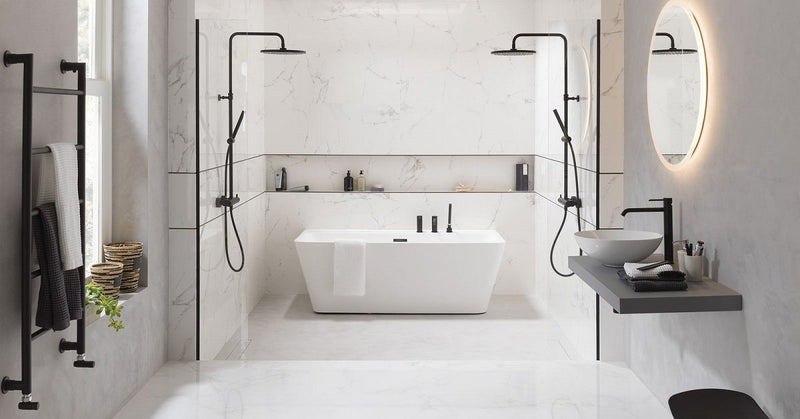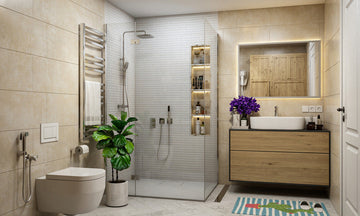The future of smart bathrooms is not just a distant dream; it is rapidly becoming a present-day reality. As technology continues to evolve, the once mundane bathroom is transforming into a hub of innovation and efficiency. For those in the Industry QA field, understanding the potential of smart bathrooms is crucial to staying ahead in this ever-evolving landscape.
In this article, we'll delve into the exciting advancements in smart bathroom technology and explore how these innovations are set to revolutionize our daily routines.

Transforming the Bathroom Experience
The modern bathroom is no longer just a place for personal hygiene. With the integration of smart technology, it is evolving into a space that offers convenience, comfort, and even luxury. These advancements are not only enhancing the user experience but also paving the way for more sustainable and efficient bathroom solutions.
One of the most significant trends in the future of smart bathrooms is the integration of voice-activated systems. Imagine walking into your bathroom and simply commanding the shower to start at your preferred temperature or asking the mirror to display the latest weather updates. Voice-controlled devices are becoming more sophisticated, offering users a hands-free and seamless experience.
Smart Fixtures and Energy Efficiency
Another critical aspect of the future of smart bathrooms is the focus on energy efficiency. With the growing concern for environmental sustainability, smart bathroom fixtures are designed to reduce water and energy consumption. From smart toilets that use minimal water to automated faucets that minimize wastage, these innovations are not only eco-friendly but also cost-effective.
For those looking to incorporate smart technology into their bathrooms, exploring options like smart showers, which allow precise control over water usage, can be a great start. These fixtures are designed to offer maximum comfort while minimizing environmental impact.
Enhancing Hygiene and Health
In a post-pandemic world, hygiene has become a top priority, and the future of smart bathrooms addresses this concern head-on. Smart bathrooms are equipped with features that ensure optimal cleanliness and health. For instance, touchless taps and toilets reduce the risk of germ transmission, while UV sanitation systems in mirrors and cupboards keep surfaces germ-free.
Additionally, smart bathrooms can now be equipped with health-monitoring devices. These systems can track vital signs, such as heart rate and blood pressure, providing users with real-time health data and alerts. For Industry QA professionals, understanding these innovations can be pivotal in evaluating the quality and performance of smart bathroom products.
Luxury Meets Functionality
The future of smart bathrooms is not just about practicality and efficiency; it also offers a touch of luxury. From customizable lighting that sets the mood to smart mirrors that provide personalized skincare advice, these innovations elevate the bathroom experience to a whole new level.
Incorporating smart bathroom gadgets into the design can transform any ordinary bathroom into a luxurious retreat. For those in the industry, staying informed about the latest trends and products is essential for delivering top-notch solutions to clients.
Integrating with the Smart Home Ecosystem
As homes become increasingly smart, bathrooms are no exception. The future of smart bathrooms lies in their seamless integration with the broader smart home ecosystem. By connecting bathroom devices to a central hub, users can control and monitor their entire home from a single interface.
This integration not only enhances convenience but also allows for better energy management and security. For Industry QA professionals, understanding how smart bathrooms fit into the larger smart home framework is crucial for ensuring compatibility and functionality.
For more insights into integrating smart technology into your home, check out smart home leak prevention tips for a holistic approach to home automation.
Challenges and Considerations
While the future of smart bathrooms is promising, it is not without its challenges. Security concerns, compatibility issues, and the need for regular updates are some of the hurdles that need to be addressed. For those in the industry, staying informed about these challenges is essential for developing and maintaining high-quality smart bathroom solutions.
Additionally, understanding consumer preferences and needs is crucial for creating products that resonate with users. By staying abreast of industry trends and innovations, professionals can ensure that they offer solutions that are both cutting-edge and practical.
Conclusion
The future of smart bathrooms is bright, with innovations that promise to enhance convenience, efficiency, and luxury. For Industry QA professionals, understanding these trends and technologies is essential for staying competitive in the market.
As we move towards a more connected and automated world, the bathroom is no longer just a functional space; it is a reflection of our lifestyle and technological advancements. Embracing the potential of smart bathrooms can lead to a more sustainable, comfortable, and enjoyable living experience.
For more information on stylish bathroom designs and future trends, visit bathroom trends 2025 for inspiration and ideas.

FAQ Section
1. What are the key features of a smart bathroom?
A smart bathroom typically includes features such as voice-activated systems, energy-efficient fixtures, and health-monitoring devices.
2. How can smart bathrooms improve hygiene?
Smart bathrooms enhance hygiene with touchless fixtures, UV sanitation systems, and real-time health monitoring.
3. Are smart bathrooms environmentally friendly?
Yes, smart bathrooms are designed to be eco-friendly, with features that minimize water and energy consumption.






